Goats and chickens are real characters. Goats get up to nonsense, and chickens can be sassy. Together, they make an interesting bunch.
You might have a large backyard and want to add these two mischievous animals to the mix. You ask: Can goats and chickens live together?
The simple answer is yes. You will, however, need to make proper arrangements to keep food stations and sleeping areas separate.
Careful and slow integration is necessary if you plan to let them share a pasture.
Goats and chickens create a lot of mess and poop.
The bonus is that you can make compost to enrich other areas of your yard. They will also help you minimize waste because they eat weeds other animals won’t and love kitchen scraps.
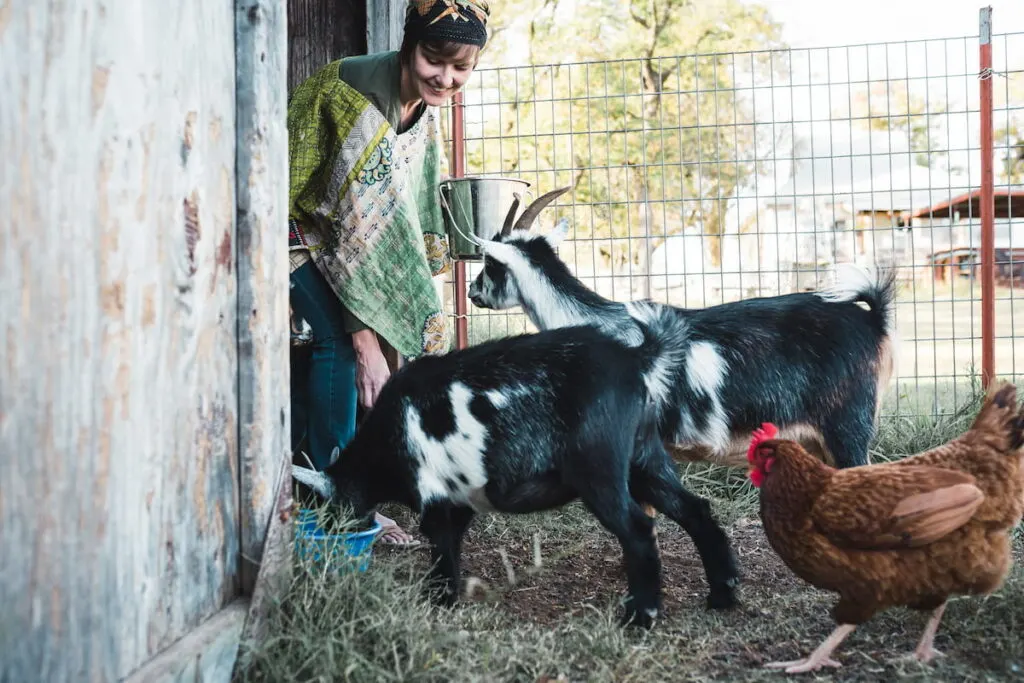
Below is a guide on everything you need to know about goats and chickens living together. It will help you create the perfect space for both animals to thrive.
Pros and Cons of Goats and Chickens Living Together
It’s important to consider the pros and cons when choosing to raise goats and chickens together.
Pros
- Chickens reduce goat waste as they clean up after their furry friends.
- Chickens eat all the bugs and parasites that make their homes near goat’s pens.
- Goats produce milk.
- They don’t protect each other directly but can passively help each other.
- Goats and chickens often form deep bonds, making them good companions.
- Goats are less prone to worms when they pasture with chickens.
- You can turn their poop into compost.
- You can reduce waste by feeding the goats chicken scraps.
Cons
- Chickens and goats are messy and produce a lot of waste.
- They can injure each other when they pasture together.
- Goats and chickens pass diseases onto each other, so that can increase costs.
- Goats will eat the chicken feed, but they really shouldn’t.
- You need lots of effort to adequately set up the area.
Goats and chickens make great living companions if you provide the right food and housing.
Separate Sleeping Arrangements are Necessary with Goats and Chickens
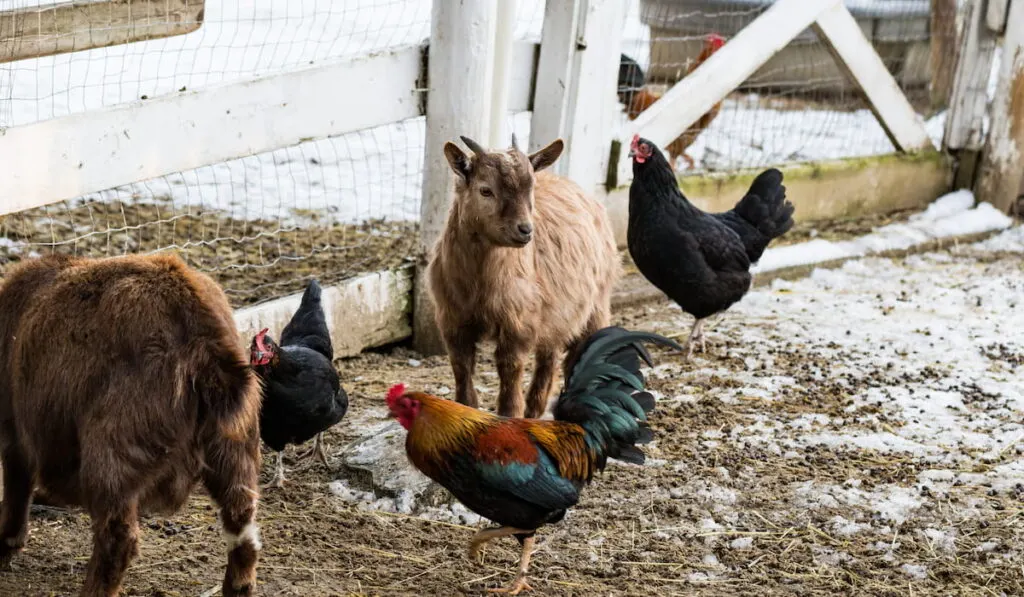
Goats and chickens are happy to share a pasture with each other, but they must have separate living and sleeping areas.
Each animal requires certain things to feel comfortable in their homes.
You will need to take a few precautions to make sure your chickens don’t make it into the goat shed and vice versa.
For example, chickens are roosting birds and will soil the hay they sleep on.
Goats won’t sleep on or eat it when that happens.
Chickens also need a little more protection from predators as they are easier targets.
What Do Goats Need to Live Comfortably?
You must build a shed-like structure for your goats to sleep in. It’ll give them extra protection from the elements and potential predators.
Ensure the area has:
- 20-30 ft² per goat depending on the size of the goats
- Clean bedding that’s replaced regularly as goats will poop in it
- A separate enclosure for birthing moms; they will stay there until the kid is strong enough to join the herd
- A food and water station; you should have one outside the enclosure as well
- A strong structural design with reinforced walls; goats like to butt heads and rub up against the walls
- Minimal perching space in case your chickens escape
Those are the crucial elements to consider. You can also build a milking station in a separate area if you plan to milk your goats.
You could also hang a hay rack, but avoid leaving space for the chickens and goats to climb on it.
What Do Chickens Need to Live Comfortably?
Chickens require a little less to feel comfortable in their space as they are smaller than goats. Their ideal home would have:
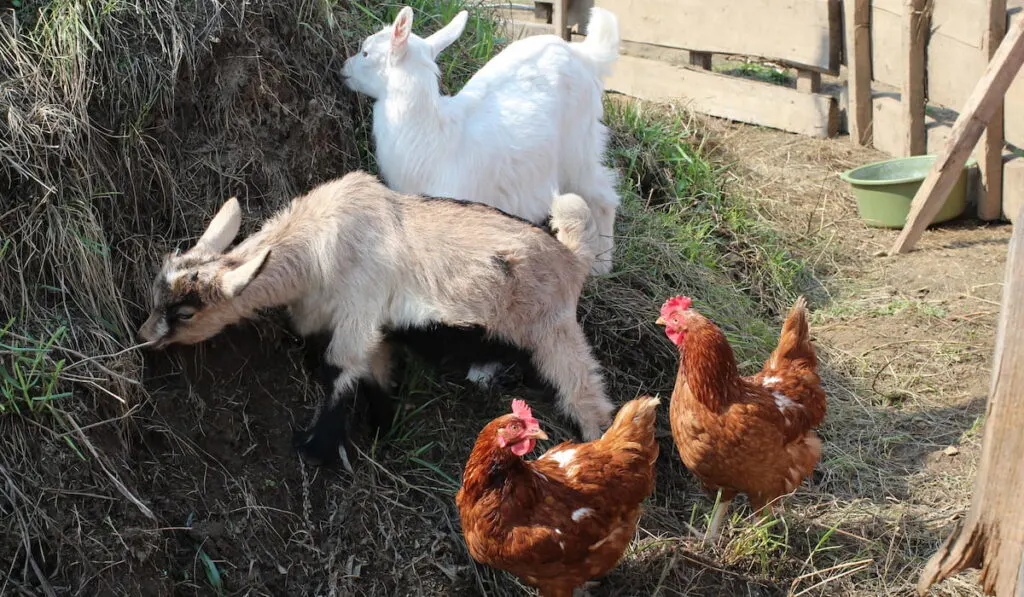
- 4 ft² of space per chicken
- Places to perch like bars or wooden slats
- Separate nesting boxes for egg-laying; although, they will need training
- Food and supplements stations
- Water area
It’s crucial to regularly clean their sleeping and laying quarters as chickens leave a lot of droppings.
Teach Your Chickens to Use Nesting Boxes if You Have Goats
Chickens sometimes need a little training to lay their eggs in nesting boxes.
They will lay them all over your yard or in your goat’s hay if you don’t train them. Here’s a simple guide to follow:
- Keep your chicken inside their new coop for a few days after moving them.
- If they are young, keep them away from the nesting boxes.
- Let them run free in a small enclosure after this, but bring them back into their coop every evening. The chickens will soon learn the habit and do it themselves.
- Once they are settled (around a week or so), let them run free in a designated pasture. You can create one in your backyard with poles and wire fencing.
- Your chickens can now learn to use their nesting boxes. Place ceramic eggs into a couple of the boxes and open them up for the hens to explore.
- Be sure to look out for any chickens that slip into the goat’s area during this process. You want to keep them as separate as possible.
Following these steps also makes it easier to train your chickens in general. They will learn where their home is and be less likely to interfere with your goats.
Do Goats and Chickens Protect Each Other?
Goats won’t protect your chickens in the way you might think.
If a predator comes to nab one of your hens, it’s unlikely your goat will save the day. Better to get a dog or llama to do the protecting.
Of course, it’s not to say it never happens, but it is rare. There are two kinds of protection that might occur: active and passive.
With active protection, goats or chickens defend each other in a dangerous situation. It might be more common with larger goats.
Passive protection is more of a warning sign. Chickens or goats will create a commotion that alerts the other to danger.
Goat and Chicken Pasture Ideas
Goats and chickens have a few basic needs to feel content in a pasture.
Chickens love to forage and don’t need a massive area. Goats require at least 200-300 ft² to be happy.
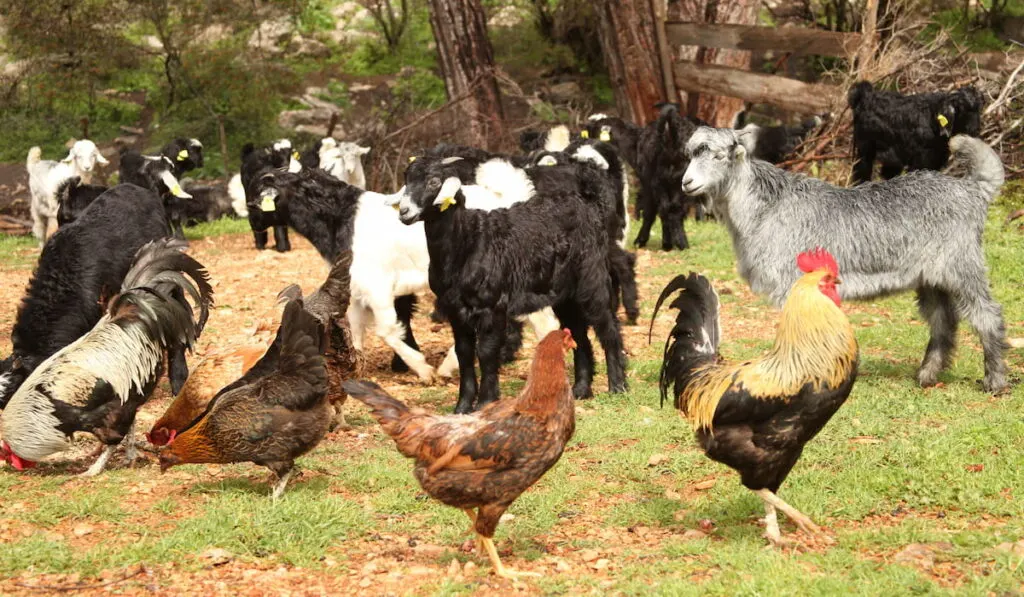
Here are a few tips to remember when pasturing your animals. There are a few options to choose from. Find what works best for you.
Shared Pasture
One great thing about pasturing goats and chickens together is that they control different aspects of the area.
Chickens scrounge for pests and eat some weeds while goats munch on shrubs and other weeds.
When it comes to fencing, chickens don’t need much. They usually stay in the pasture if you train them well.
It’s best to clip their wings because they will sometimes fly over a fence.
It’s better to focus on building a fence that’s strong enough to keep your goats in. They are naughty kids even when they’re adults.
They also love to butt heads and rub their bodies along fencing. Most places recommend using no-climb fencing with 4×4 or 2×4 for tiny goats.
You will need to slowly introduce goats and chickens to each other. Injuries sometimes happen if the animals aren’t used to pasturing together.
You must monitor their health, too. Diseases spread more quickly in a shared space.
Separate Pastures
You would need a minimum of two pastures to keep goats and chickens separately.
It’s not ideal because you need more space. Goats are also more prone to worms when they pasture on their own.
There are benefits to pasturing them in this way. The first is that you reduce cross-contamination, so fewer diseases spread. You also reduce the risk of injuries.
Chickens don’t require as much fencing as goats.
You must put a fence around the whole pasture if they share it because your goats will escape if you give them a chance.
You can save money if you have a separate area for your goats because it’ll cost less to do a smaller space.
Shared Pasture with Rotation
Rotating a shared pasture is one of the best ways to pasture your goats and chickens.
Sometimes the land needs a chance to recover from animal life.
The pasture will have a chance to replenish and can benefit from the manure the animals make.
Chickens are expert bug exterminators, so they can control all your pests.
They also help break down goat dung to reduce the risk of worms in goats.
The downfall is that you need a minimum of two pastures to make this work. Once again, there are issues with diseases spreading between the two animals, and the risk of injury increases.
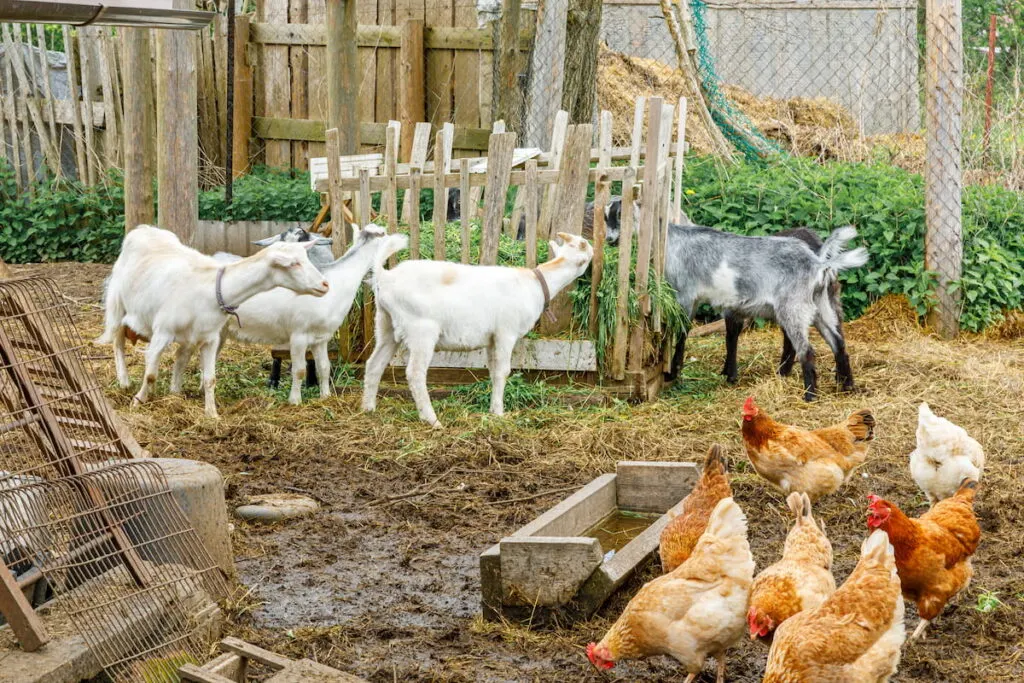
Separate Pastures with Rotation
If you have space and want to keep your goats and chickens apart, then rotating separate pastures is the way to go.
It reduces almost all risks of parasite transfer and injury.
The pitfall is needing a minimum of two pastures to pull this off. You know your space and animals the best.
Choose a pasturing setup that will leave you and them feeling happy.
Keep the risks and benefits in mind when making a decision.
Keep Goat and Chicken Food Stations Separate
We discussed their living and roaming requirements, so now, it’s time to look at food and nutrition.
Goats and chickens must have separate food stations.
Keep chicken feeding stations inside to prevent goats from getting in.
As with their living arrangements, goats and chickens require different nutrients to grow strong and stay healthy.
What Do Goats Need to Stay Healthy?
Goats aren’t fussy eaters, but they won’t eat any food that’s been soiled in any way. Their favorite things to munch are:
- The tips of shrubs, trees, and vines
- Goat feed
- Hay (alfalfa or grain)
- Broad-leafed plants
You must give them extra hay and goat feed if you have poor pasturing land.
They won’t need as much of it if there are plenty of bushes and weeds for them to eat in their pasture.
Make sure to give milking goats extra hay to increase protein intake.
They sometimes need copper supplements to keep them healthy. Goats shouldn’t eat molds and listeria bacteria.
Goats love snacks like fruits and vegetables.
Goats can help you reduce waste because you can feed them your kitchen scraps. Be sure to check what they can and can’t eat. Here is a quick guide for the best snacks to feed goats.
- Watermelon
- Pears
- Peaches
- Bananas
- Grapes
- Carrots
- Lettuce
- Celery
- Pumpkin
- Squash
- Spinach
Avoid giving your goats cat and dog food. It contains ingredients that aren’t healthy for their digestion.
Also, never give them avocados. They are exceptionally poisonous to goats.
Plants from the nightshade family are also dangerous for goats, except for ripe tomatoes.
Only give them a little at a time, and be sure to keep them out of your tomato patch if you’re growing them.
What Do Chickens Need to Stay Healthy?
Chickens are much like pigs. They will eat almost anything you give them.
Chickens require feed and supplements to be healthy even if they roam free. Their age determines the type of feed you will give to them.
You can leave oyster shells and special gravel supplements out for them to eat at their leisure.
On-demand feeding stations work best because chickens will stop eating when they are satiated and can help themselves.
Avoid feeding your chickens too much canola meal because it will make their eggs taste like fish.
If you give your chickens a balanced feed, you won’t need to supplement their meals with micronutrients.
Chickens also help with reducing waste and love leftovers. Here are some of the best snacks for chickens.
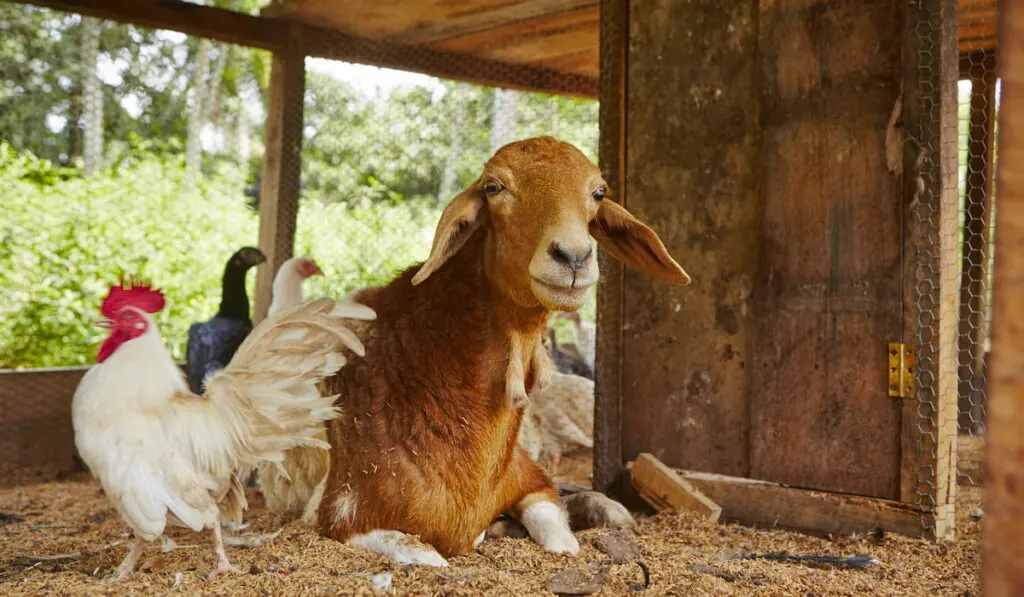
Remember, everything in moderation.
- Broccoli
- Banana
- Grapes
- Pineapple
- Tomatoes
- Celery
- Strawberries
- Apples
- Oranges
- Asparagus
- Blueberries
- Crickets and worms
- Bread
Never feed your chickens chocolate, avocado, peanuts, or eggplants. Also, make sure they don’t eat the following plants.
- Foxglove
- Morning glory
- Yew
- Tulips
- Rhododendron
- Monkshood
- Castor Bean
- Nightshade
These plants are poisonous to chickens. They usually know to avoid them on their own, but it’s good to check their pasture for any of these plants before letting them roam.
Keeping Chickens Away from Goat Food
It can be tricky keeping your chickens out of your goat’s food and shelter.
There are a few measures you can take to stop them from getting in.
First, store your grain in an aluminum tin, barrel, or can, depending on how much you purchase at a time. It will prevent rodents from getting into your stash.
With an adequate pasture, your goats shouldn’t need additional feed. Sometimes you need to feed them more in winter.
You will need goat feed if you are milking them or they are pregnant. In both cases, give them a handful of grain in the morning.
You can also put grain in a bucket while milking your goat. This will keep the animals calm, and other animals won’t eat the grain.
You also don’t have to leave the food out all day. Feed them at specific times of the day.
As an extra precaution, you can feed your goats before letting your chickens out of their coop. That’s the best way to keep them out of your goat’s food.
Keeping Goats Away from Chicken Food
Now, we need to keep the goats out of the chicken feed. Chickens will need feed even if they are free to forage.
The simplest and easiest way to do it? Put the chicken feed inside their coop and never put anything outside.
The chickens will forage for food when roaming and can eat their feed inside if needed.
Your goats won’t be able to get into the coop. Make a chicken-sized doorway for them to run in and out at their leisure.
Be sure to set up an on-demand feeding station, so they always have food available.
Remember to put a water dispenser by the feeding station and regularly change it.
They need fresh water to stay healthy. Your chickens will be safer using this method, too, because other predators can’t sneak up on them while they are drinking or eating.
Risks with Goats and Chickens Living Together
Accidents and diseases happen when you raise different species together. Chickens and goats are no exception.
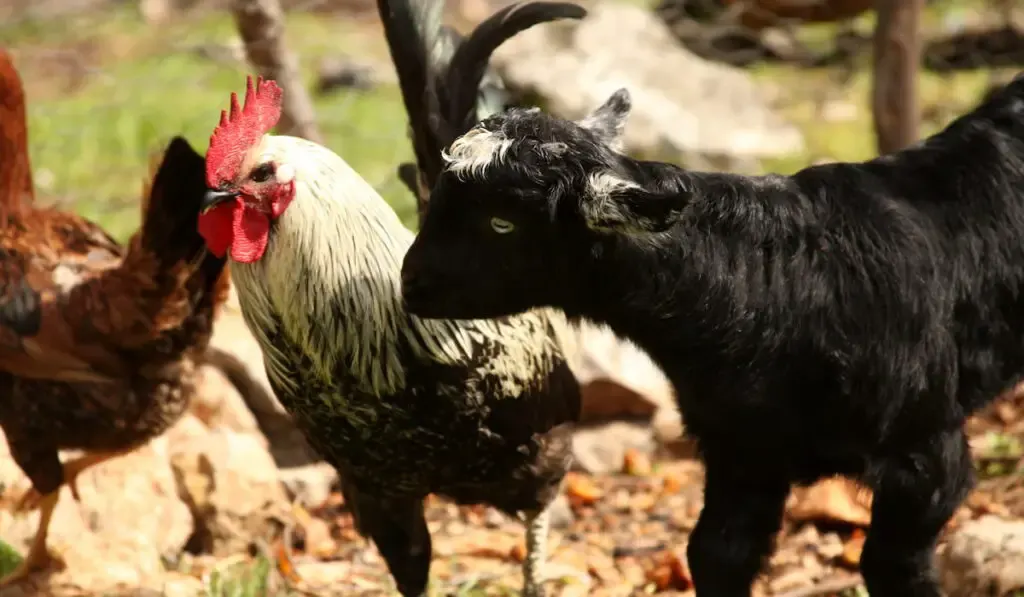
Disease
Before looking at cross-contamination, you must consider the diseases that often affect goats and chickens.
Chickens carry disease strains like salmonella, campylobacter, and E. coli, in their digestive tracts and feces.
Goats get pneumonia, foot rot, toxicity from pregnancy and inappropriate feeds, pinkeye, pseudorabies, foot-and-mouth disease, and mastitis.
Controlling their manure helps reduce the risk of these diseases spreading.
Worms and mites are the parasites that plague chickens, while goats struggle with worms. Pasturing them together reduces the risk of worms as chickens eat these parasites.
Coccidiosis is a common disease among livestock.
Goats and chickens have different strains that affect them, so it isn’t usually passed between the two species.
Cryptosporidiosis, on the other hand, isn’t common in chickens and is fatal to goat kids. It’s an internal parasite that can even spread to humans.
Injury
Several injuries can happen when goats and chickens live together.
Goats sometimes stomp or trample chickens when running or excited.
If a goat headbutts one of your chickens, they may develop internal injuries that later cause death.
We all know goats love to jump and climb. They sometimes land on a chicken and crush it.
Despite being much smaller, chickens can also injure goats. They usually peck at them when feeling threatened. Roosters have spurs and sometimes use these to slash goats. Chicken also use their feet to scratch other animals. These injuries can get infected and make your goats sick.
Remember that chickens and goats will destroy eggs, so make sure you have nesting boxes.
They are usually damaged by accident because goats don’t really eat eggs. Although, some people argue otherwise.
When Life Hands You Poop, Make Compost
You must start accepting that your life will be filled with feces once you get goats and chickens.
These animals drop their dung wherever and whenever they feel like it.
The main issue is when it gets too close to their food, water, and sleeping areas.
Parasites and other bacteria spread to your goats and chickens. It can sometimes be fatal. So, when life hands you poop, make compost.
Making compost isn’t that difficult. You can make a dedicated station where you throw all waste.
You can use pressurized wood for the walls and dig a hole in the center to throw everything into.
The lime and other ingredients from goat and chicken manure, as well as their bedding mean you don’t have to do any work. Just throw it there and let it brew.
Be sure to use easy-to-scoop bedding like straw or pine pellets. You can scrape up the mess and add it to your compost heap.
Use the compost to enrich the soil in your gardens and even pastures.
Buy a turning composter if you want to speed up the process. A drawback is that it doesn’t produce large amounts of compost. The bigger ones cost a lot more.
Final Thoughts
Goats and chickens will happily roam together but must have separate food and shelters.
They can pass diseases between each other and sometimes cause injuries.
Whether you can raise them together depends on how much space and time you have to set everything up.
Goats and chickens make the best of friends once they are socialized and you will enjoy watching their antics.
Just make sure you make the effort to ensure everyone’s health and safety.
RESEARCH
- https://www.betterhensandgardens.com/how-to-keep-goats-chickens-in-the-same-yard/
- https://bestfarmanimals.com/can-goats-and-chickens-live-together-pros-and-cons/
- https://backyardhomesteadhq.com/how-to-raise-chickens-with-goats-11-tips-that-work/
- https://animals.mom.com/treats-that-goats-can-eat-7949442.html
- https://www.thehappychickencoop.com/chicken-treats/
